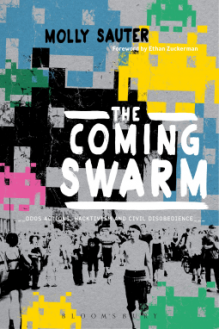
The importance of the internet as a living space cannot be understated. Already millions of people rely on it for professional purposes, socialising, research, news, communication, self-expression and so on. It follows that it should be an important tool for political and social activism, and traditional activist groups have used it as a rally point and communication device, translating tools such as petitions, campaigns and fundraisers into the virtual space. These techniques are widely accepted and respected as activist tools, and as such are protected by law. But the internet is fundamentally different from physical space, and it has given rise to entirely new forms of protest and activist actions. One of these is the DDoS (distributed denial of service) action. In this book, researcher Molly Sauter sets out to explore the importance and validity of DDoS actions as an activist tool, giving an historical perspective of the tool’s use by several groups, including The electrohippies and Anonymous.
Despite activist efforts, DDoS is still widely considered a criminal activity, and the media and the powers-that-be on the internet do little to dispel this idea, with their fixation on stereotypical, negative views of “hackers” and the disproportionately harsh punishments enacted on those who are discovered to engage in these activities. Sauter does a great job explaining the complicated affair of attempting to encourage social and political change in a space that is essentially dominated by private interests. The physical world has public spaces - the internet does not.
One of the points the author made that really drove it home for me was the question of accessibility, and how the internet gives people the illusion that everyone now has a voice, that everyone can make his or her opinion heard, that the internet is the great democratiser of public life. But the truth is different. The internet is a big place: unless you already have an established audience or are lucky enough to go viral, your voice is likely to get lost in the noise. The average person does not have the means of a massive corporation, and obviously that will have an impact on that person’s influence. Moreover, the internet is not a free place: it is largely controlled by private interests which work very hard to make sure they have a monopoly on people’s attention. One only has to read the recent discussions surrounding net neutrality to understand that these private companies do not fight a fair fight. They already have control, and they are striving to have more. While it’s true that almost everyone can publish their opinions (however unpleasant they may be to the powers-that-be) online, that does not necessarily mean they will get attention. You’re not guaranteed to have an audience. This is why protests in public spaces are so widely used: you can’t make them invisible. By their nature, they force people to pay attention. How can you do that in the online space? Are DDoS actions the answer?
This book is not only essential for those who are interested in the future of activism and the role that the internet might play in it; it’s also useful for anyone who wishes to truly understand how the internet works, and as a consequence, how it affects those who choose to lead a large part of their lives online.
The writing is a major plus: rigorous, academic, but still easy to understand and interspersed with moments where the author’s passion about the topic shines through. I immediately identified with the writing because it’s the type of academia that I love: firmly grounded on theory and facts, but with real world impact beyond the (often closed) world of research. Molly Sauter is not afraid of showing the hypocrisy behind the non-acceptance of this kind of activism both by the general public, but also (perhaps more importantly) by the traditional activist community as well.
My only complaint with this book is that it’s too small. I understand that, as a Master’s dissertation, it’s the ideal length, but as a book, it would have benefitted from developing some of the ideas even more. But it’s a good introductory way into the topic that still has much to interest those who already know a little about it.
Note: I got this book for review purposes through NetGalley. This review has been cross-posted to my Curious Curator blog.

 Log in with Facebook
Log in with Facebook 





